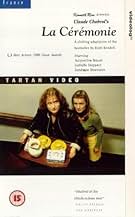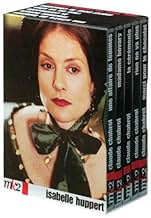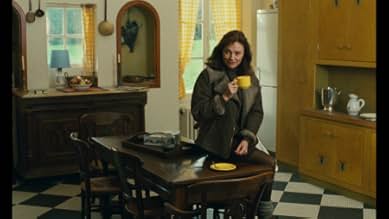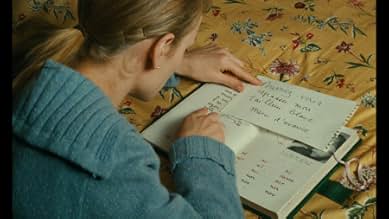A newly hired maid for a rich countryside family befriends a post-office clerk who encourages her to rebel against her employers.A newly hired maid for a rich countryside family befriends a post-office clerk who encourages her to rebel against her employers.A newly hired maid for a rich countryside family befriends a post-office clerk who encourages her to rebel against her employers.
- Awards
- 9 wins & 11 nominations
Storyline
Did you know
- TriviaThe author Ruth Rendell has said that Claude Chabrol's version of her novel "A Judgement in Stone" is one of the few film adaptations of her work that she is happy with.
- Quotes
Georges Lelievre: [referring, respectively, to Sophie the illiterate maid and Jeanne the nosy postal clerk] What a pair: one can't read at all, and the other reads our mail.
- ConnectionsFeatured in Isabelle Huppert: Message personnel (2020)
- SoundtracksCello Symphony
Composed by Benjamin Britten
Featured review
Claude Chabrol, one of the leading lights of the French New Wave, faded into a series of unimaginative throwaway flicks and obscurity (peppered with moments of worthiness such as Blood Sisters )until storming once again into the limelight with this claustrophobic psycho-thriller adaptation.
Like Heavenly Creatures and Fun this film is anchored around the destructively intense relationship between two female leads: the apparently insipid family housemaid Sophie (Sandra Bonnaire) and the sparky but cumulatively obnoxious postmistress Jeanne (Isabelle Huppert). They both, it transpires, have potentially murderous secrets in their past involving the incineration of unwanted relatives (a child and a father). After a roundabout, deliberately vague "confession" to each other they erupt into childish laughter and it seems their relationship is cemented in their mutual utter lack of remorse.
There is no guilt felt by either woman for any of their crimes be it spite, neglect, theft, opening other's mail, arson or even murder. This is because, primarily though Jeanne's obsessive class angst and Sophie's obsessive paranois, they justify their stance and actions with an "us against them the world" self-righteous fervour. Jeanne describes all her - increasingly erratic - behaviour as "a good deed" and the equaly unstable Sophie believes her.
Every role is acted impeccably by some of the leading lights of French cinema. Along with Bonnaire and Huppert, arguably the best French actresses working today, Jacqueline Bisset plays the bourgeouse lady of the house for whom Jeanne works. She sees herself as a kind and understanding employer, providing glasses and a television for her taciturn domestic. However this gesture is interpreted as patronising by the illiterate Jeanne.
It's through minot details such as this that character exposition arises . The two principals are painted with tiny, finely detailed brushstrokes while everyone around them is painted with broad strokes. This intentional disparity brings us uncomfortably closer to the unhinged worlds of Jeanne and Sophie. Worlds which are revealed slowly, subtly and manipulatively.
La Ceremonie is based of a Ruth Rendell novel, "Judgement in Stone". Rendell is an archetypal British writer and I think that if La Ceremonie was a British film with British actors and a skilful British director it would have been a very different, darker and more disturbing movie. Having said this, Chabrol, with his distinctly French sensibilities and post nouvelle vague expertise brings other qualities to the story and makes this a remarkable film. Chabrol avoided darkness for the sake of it in favour of a highly sophisticated level of characterisation and build-up. The climax, however it was filmed, could never be anything less than shocking.
Ultimately la Ceremonie presents a pessimistic view of humanity: bleak, depressing and disturbing. Even Bisset's family don't come off well with their selfishly consumereist and blinkered middle class lifestyles.This and the high degree of audience manipulation means the film leaves a bad taste in the mouth but there's no denying it's an egregious work of art.
Like Heavenly Creatures and Fun this film is anchored around the destructively intense relationship between two female leads: the apparently insipid family housemaid Sophie (Sandra Bonnaire) and the sparky but cumulatively obnoxious postmistress Jeanne (Isabelle Huppert). They both, it transpires, have potentially murderous secrets in their past involving the incineration of unwanted relatives (a child and a father). After a roundabout, deliberately vague "confession" to each other they erupt into childish laughter and it seems their relationship is cemented in their mutual utter lack of remorse.
There is no guilt felt by either woman for any of their crimes be it spite, neglect, theft, opening other's mail, arson or even murder. This is because, primarily though Jeanne's obsessive class angst and Sophie's obsessive paranois, they justify their stance and actions with an "us against them the world" self-righteous fervour. Jeanne describes all her - increasingly erratic - behaviour as "a good deed" and the equaly unstable Sophie believes her.
Every role is acted impeccably by some of the leading lights of French cinema. Along with Bonnaire and Huppert, arguably the best French actresses working today, Jacqueline Bisset plays the bourgeouse lady of the house for whom Jeanne works. She sees herself as a kind and understanding employer, providing glasses and a television for her taciturn domestic. However this gesture is interpreted as patronising by the illiterate Jeanne.
It's through minot details such as this that character exposition arises . The two principals are painted with tiny, finely detailed brushstrokes while everyone around them is painted with broad strokes. This intentional disparity brings us uncomfortably closer to the unhinged worlds of Jeanne and Sophie. Worlds which are revealed slowly, subtly and manipulatively.
La Ceremonie is based of a Ruth Rendell novel, "Judgement in Stone". Rendell is an archetypal British writer and I think that if La Ceremonie was a British film with British actors and a skilful British director it would have been a very different, darker and more disturbing movie. Having said this, Chabrol, with his distinctly French sensibilities and post nouvelle vague expertise brings other qualities to the story and makes this a remarkable film. Chabrol avoided darkness for the sake of it in favour of a highly sophisticated level of characterisation and build-up. The climax, however it was filmed, could never be anything less than shocking.
Ultimately la Ceremonie presents a pessimistic view of humanity: bleak, depressing and disturbing. Even Bisset's family don't come off well with their selfishly consumereist and blinkered middle class lifestyles.This and the high degree of audience manipulation means the film leaves a bad taste in the mouth but there's no denying it's an egregious work of art.
Details
- Release date
- Countries of origin
- Official site
- Language
- Also known as
- La Ceremonie
- Filming locations
- Production companies
- See more company credits at IMDbPro
Box office
- Gross US & Canada
- $873,196
- Gross worldwide
- $873,196
- Runtime1 hour 51 minutes
- Color
- Sound mix
- Aspect ratio
- 1.66 : 1
Contribute to this page
Suggest an edit or add missing content


![Watch Bande-annonce [OV]](https://m.media-amazon.com/images/M/MV5BNzliMDEwMzYtMjg1NS00Mjc1LTkwNDktMzc1MmJkNDJjZDIxXkEyXkFqcGdeQXRyYW5zY29kZS13b3JrZmxvdw@@._V1_QL75_UX500_CR0)




























